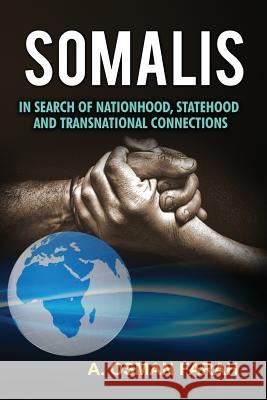Somalis: In Search of Nationhood, Statehood and Transnational Connections » książka
Somalis: In Search of Nationhood, Statehood and Transnational Connections
ISBN-13: 9781909112575 / Angielski / Miękka / 2015 / 264 str.
Contemporary scholarship characterizes Somalia as a nation in search of statehood. The approach presupposes a homogenous cohesive nation and society- with considerable traditional democratic pastoralism. This book portrays a complex nation with multiple heterogeneous characteristics. This alternative approach reflects the socio-political and the historical formations, invention and possible reinvention of the society. The book aims beyond the nation state-centric analysis. Issues discussed include: - Conceptual socio-political transnational frame of development and statehood - Analytical frames resting on diverse cases of emerging transnational civic connections - Prospects for regional educational development - Countering transnational precarity (employment and residence uncertainties), political mobilization and extremism - Transnational efforts at state formation, power and justice _____________________ A. Osman Farah is an Assistant Professor at Aalborg University where he teaches Development, transnational relations, transnationalism, transnational NGOs, New-regionalism and transnational State formation. Dr. Farah is a co-founder of the Centre for Research and Integration in Denmark and North Eastern African-Nordic Network (NEANOR). He serves as an associate editor of the Somali Studies Journal and is also a member of the editorial board of a number of journals focusing on political development and political sociology. His latest books include: Transnational NGOs: Creative Connections of Development and Global Governance, Aalborg University Press, Denmark" (2014); A co-edited book on China-Africa Relations in an Era of Great Transformations (co-edited with LiXing, Ashgate Publishing: London UK 2013)" and Transnationalism and Civic Engagement: Diasporic Formation and Mobilization in Denmark and the UAE," Adonis & Abbey Publishers, London, UK (2012).
Contemporary scholarship characterizes Somalia as a nation in search of statehood. The approach presupposes a homogenous cohesive nation and society- with considerable traditional democratic pastoralism. This book portrays a complex nation with multiple heterogeneous characteristics. This alternative approach reflects the socio-political and the historical formations, invention and possible reinvention of the society. The book aims beyond the nation state-centric analysis. Issues discussed include: · Conceptual socio-political transnational frame of development and statehood· Analytical frames resting on diverse cases of emerging transnational civic connections· Prospects for regional educational development· Countering transnational precarity (employment and residence uncertainties), political mobilization and extremism· Transnational efforts at state formation, power and justice











